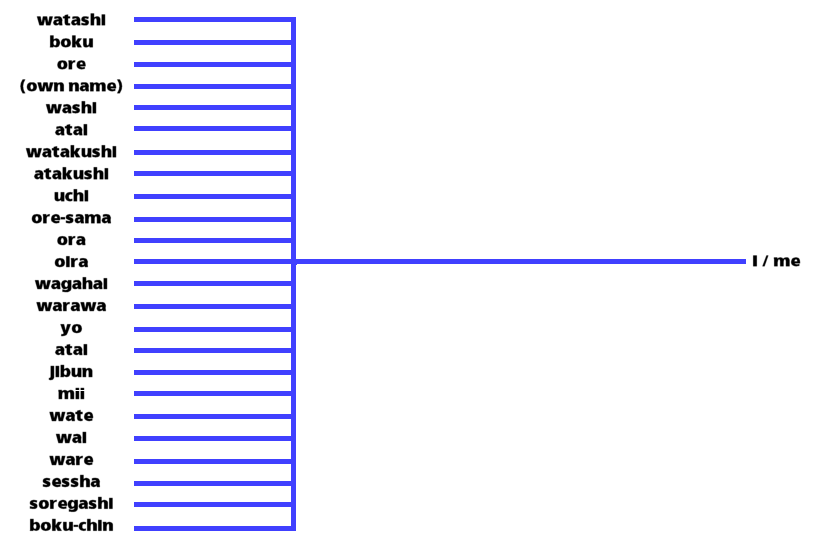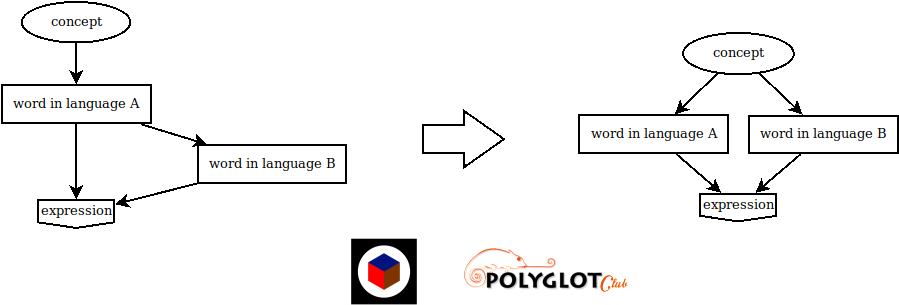Language/Multiple-languages/Culture/How-to-become-a-polyglot
A Polyglot is someone with a high degree of proficiency in several languages. Learning a language is the discovery of a new world, and polyglots can connect their minds to each of these worlds. Do you want to become a polyglot but don't know how to achieve this goal? This article will give you valuable tips on how to start this journey on the right foot.
Necessity
Someday, with the help of artificial intelligence, people will not need to learn any foreign languages. Is it true?
If you have heard about this idea, or you have asked it by yourself but somehow agree with this point of view, here is the argument from me:
If you were visiting a sick friend at the hospital, you would care for the one you visit, not the other patients. This is because of familiarity, which affects you mentally. Likewise, your proficiency in a language can determine your ability to perceive the speakers' minds. Please try watching videos about Sid Meier's Civilization V leaders, you would find that only those who speak the language you know can touch your soul.
This is what the AI can't help you with. A language is more than a means of communication.
If humans were always depending on AI, we would lose our value.
Motivation
Why do you want to learn languages? It's a basic question, but it will determine your language proficiency in the future.
- If you mainly feel bored and want to do something in your spare time, then you could be a beginner forever. You just want to pass the time, while learning a language can be boring at the intermediate level and requires effort. Thus, you probably can't make real progress.
- If you mainly want to get a better job, then you can develop useful skills, but nothing more. Your goal is just around practical things, so you will not dig into the languages and explore the culture of the speakers.
- If you are mainly forced by other people, then it's a pity. I don't know how much progress you can make because progress is mainly determined by your attitude. There are many ways to involve people in learning languages, from which coercion is the worst.
- If you mainly want to touch the world, make friends and can seriously spend time on it, then you may well become a polyglot.
Choice of Languages
Which languages do you want to learn? You may consider the easiest ones, which may have a close relationship with your native language; you also may want to learn the hardest ones, to challenge yourself; the well-known ones, which have much influence around the world; you may also want to learn the rarely-known ones, to discover distinctive cultures. It is all up to you.
If you ask me, my opinions: the most influential languages in the world; the most influential languages with close relation to my native languages; my preferences.
You can try Esperanto and/or other constructed languages because they are usually made to be easy to learn. They can help you to understand the skeleton of a language. This can be helpful before learning a difficult one.
If you want to learn a language that is not popular for learners, you should know that the materials are relatively hard to find. You will likely have to pay for it. You even have to learn another language before learning the language you want to learn, because the speakers of the firstly-learned language have better knowledge about it, or the language you want to learn is similar to this one. Many languages have a lot of loanwords, which means that if you know the languages being borrowed, you can learn the vocabulary of them quickly.
You will also need to know how long it takes to learn a language. There are an article by jason-oxenham-ceo and an article by Leon Ho to answer it.
Sequence of Learning
If you want to learn two languages with similar grammar, meanwhile their available materials are not of the same quality or are not equally suitable for beginners, it would be better to learn the one with better materials first.
In addition, the case “You even have to learn another language before you learn the language you want to learn” mentioned in the above section should also be taken into consideration.
Perspective
Pretend that you have forgotten your native language. You will start to wonder how you can express your thoughts, like how to indicate yourself, other people or objects (pronouns and nouns), how to indicate an activity (verb and verb phrase), how to describe your observation towards specific objects (adjective), how to distinguish things happened, things happening and things to happen (tense: conjugation or adverb), etc. You desire to express, but you assumed yourself unable to express in any other language, so you have got to accept the new one thoroughly. Gradually, you can manage to think and express yourself directly in the target language.
It is an urgent demand of making use of languages, instead of a school assignment.
Integration
Let's imagine a scene: You have a word list, on the one side are words in your native language, on the other side are correspondent words in a language you've never learned. If someone alters it before you see the list, you won't feel unnatural at all when seeing the wrong pairs. But if you already know these words, you would quickly find the problem out.
You could accept whatever interpreted at first, however, when you are familiar to them, you will not easily accept any change. This is because you have been integrated by native speakers. If you were more negative to your original culture, you would be even assimilated.
Most people have no idea what cultural diversity of the world is. They assume that the values in their hometowns as mostly universal. When they are abroad, they can experience the culture shock for sure.
Integrations on this degree can be done only by living there, not as a tourist, but an inhabitant.
Logic

An important part is logic. It is not only required in reading comprehensions or listening comprehensions, but also in daily life. It is life-changing and definitely deserves to be taught in elementary school, but the rulers don't want you to be smart.
Example: In German, the masculine singular nominative article is “der”. If “der” appears in a German text, it means masculine singular nominative article. Right?
In logic, it can be written in syllogism:
- All German masculine singular nominative definite articles are “der”.
- The word in the German text is “der”.
- The word in the German text is German masculine singular nominative definite article.
This fallacy is called “undistributed middle”, which beginners of logic can recognize.
There is a list of fallacies. If you didn't understand logical fallacies, you would fall into confusion easily.
In reading or listening comprehension, for example, if the text only says “He likes apples” and the question is “Does he like pears”, the logical answer is “I don't know”; if the text only says “He has two cars” and the question is “How many cars does he have”. The logical answer is “no less than two”.
You could sometimes find that the question creators have bad logic.
There is an article about practising critical thinking and reasoning. To do this in a fun way, you can also try to find plot holes in fictions and discuss them.
If you are still not determined to learn logic, let me try once more: It slows your brain's ageing.
Attitude towards Mistakes
The impression plays a big roll. By reducing the impression of mistakes, you can instantly feel the strangeness when a mistake is made. For example, when you hear “a apple”, you can immediately know what type of mistake it is.
In the ideal situation, when you make a mistake, it can be instantly corrected. But in reality, you will make mistakes without noticing them. If you keep a log of your mistakes and their types, they would be prevented easier.
If the native speaker can understand, should it not be considered as a mistake? This involves the philosophy of language. The conclusions are different, if you define being logical as correct or define being accepted as correct.
Native speakers will be discouraged from talking if you always make them feel unnatural. This is the most important reason to keep being as natural as possible.
Free or Paid
There are limitations of free resources:
- They may not be very reliable. Also, it is harder to find out its errors if you have only one material.
- You will lack proper training, especially on speaking and writing. You can find native speakers online, but few of them have teaching skills. You can chat online, but without payment, no individual and no group can keep you practising and point out all your mistakes.
Many people become upset and quit it on their endless ineffective ways. If you pay and pay the right ones, you will save time, and even save your determination. Meanwhile, they are businesses, so they will also try to waste your money.
If you learn easy languages such as Esperanto, there is no much difference between the free and the paid.
Methods and Experiences
You need to be both the coach and the athlete, especially when you don't rely on paid services.
You may have heard this tone: you will succeed as long as you work hard. This is a trap. You also need good methods. Some other people can act as a coach for a price, but if you do it on your own with insight, you will gain more.
As a coach, your methods of learning should suit your own habit and be effective. You can find other people's methods and choose the suitable ones. If you are sure that a method is effectless, abandon it and choose another one right away. Watch yourself, don't goof off. Do not rely on the “word of the day”, do not believe Duolingo's advertisements. If you are a beginner, anything feels working for you. If you are serious about learning languages, you can find that they are just illusions. Yes, in my opinion, those on Duolingo are mostly a bunch of kids who just want to show off their badges. I would like to see how they call emergency services in Klingon, while mastering gay sentences.
As an athlete, you should do enough exercise. An athlete should practise an action over and over again every day. It's the same with learning languages.
There are generally two approaches in the language learning: one is learning vocabulary and grammar systematically and then do reading, listening, writing, speaking; the other is learning without learning vocabulary and grammar systematically and learn only through reading, listening, writing, speaking.
The first approach is how a foreign language is taught at school, the second approach is how a native language is taught at home. They both have advantages and disadvantages. These two approaches are just like these: the first is becoming a car mechanic first and becoming a driver next; the second is becoming a driver first and not necessarily becoming a car mechanic.
There are some tips on
They are just some advice. I don't follow that “drink caffeine”, for example.
If you want to follow that "Take up a musical instrument", you can try the virtual piano, accordion or melodeon.
You can practise meditation as it is proved to be beneficial in many aspects. You will be able to focus on tables of declensions, pronouns, and so on, then recall them quickly.
There is a great finding called “forgetting curve”. It should be taken into consideration. Always prepare to forget and review.
Good scheduling is essential. There is an article and a picture showing how to schedule your day effectively. You can also practise the pomodoro technique.
You also need to learn actively. There is the Cone of Experience, it's not based on statistics, however. There are also things called active and passive learning, which should be considered. Contributing to Polyglot Club Wiki is also active learning.
Avoid learning easy-to-confuse things at the same time. You need to pick one of them (usually the more frequently used one), try to be familiar with it and ignore the other for some time.
Don't be afraid to ask. I have met people asking this question as well as myself: In a cliché of fictions, a character's last words are never fully spoken, so if the character had spoken in that language, would that be different, like saying the murderer's name before he dies? After finding the solution to this, I learned more than what textbooks told me.
Basic linguistic knowledge can provide you a better understanding. There is a playlist for it.

Best methods for learning nothing
Resources
If you have good tools, you will make your progress faster.
https://polyglotclub.com/wiki/Language/Multiple-languages/Culture/Internet-resources-for-polyglots
Essential Terms
These words are for language learning.
When you understand their meanings, you won't be frustrated by encountering unfamiliar terms from time to time.
Pronunciation
International Phonetic Alphabet is not very hard to learn, if you know the structure of oral cavity.
When dealing with sound changes, you might feel it hard to memorise the rules. Native speakers do so, because they tend to be lazy. You can just let it happen: ignore sound change rules and just pronounce what it “should have been”, repeat it faster. You will naturally understand why sound changes happen.
Vocabulary
If you do not have the determination of spending time on memorising vocabulary, you would be unable to speak the language freely.
I am fed up with the metaphor comparing vocabulary to food. In my own opinion, one's vocabulary is pieces of the world that one can depict.
You must overcome the frustration of forgetting most of the words you've just learned. Don't expect to memorise them once and for all, prepare to review every word you've met, multiple times. A little tip that people should have learned in primary schools: read the word 3 times, then read its meaning 1 time.
Your confidence will grow following the growth of your vocabulary.
A word may have different meanings and when you read or listen to something, it is the context that determines which one it is in that case.
Words in two languages are usually not one-to-one correspondent. Even if two words in two languages have the same meaning(s), their usages and frequencies are often not all the same.

According to Word Counter, you need to know around 40 000 (uninflected) words to reach a native speaker's vocabulary level. Assuming that the law of the vital few can be applied here, you need to master about 8000 words to communicate fluently.
To build your vocabulary, you can follow this way:
- Find a flashcard deck in considerable size and practise, in this wiki lesson or somewhere else;
- Visit the frequency list, find words that you are still not familiar with under a specific frequency, create your own flashcards and practise.
- Increase the frequency range and repeat the last step.
Alternatively, you can find a dictionary file with considerable number of words or scrape from the web, then try to convert it to TSV file, import it as a flashcard deck and practise.
To start from basic words, you can try the Swadesh list.
Dictionary
How to choose a dictionary? First, see which brands have good reputation; second, see what you need:
- if you are a beginner of the language, then a dictionary with 5 000-10 000 entries is enough for your current level;
- if you want to use for daily life, then a dictionary usually with 30 000-50 000 entries is enough;
- if you want the words as many as possible, then buy the thickest one, which usually have more than 100 000 entries, but you will need to spend more time on finding the entry you want as well as more money;
You may want to ask: when should I choose a dictionary with 10 000-30 000 or 50 000-100 000 entries? Well, if you want a bit more than these recommended numbers, you can try them.
A good dictionary should be able to explain a word with words that are more basic. This is what Wiktionary hasn't done.
There is an article on how to choose a dictionary.
You may want to memorise all words in a dictionary. Before that, a good command of the most frequently used words is more important. You can build your confidence before touching higher levels.
If you think you should obey the dictionaries, you've got yourself wrong. Do not worship the authority. It is because of that they can reflect the reality, they become authoritative. It is the people that defines what a dictionary should be, not the other way around.
I won't forget that national college entrance exam preparation: the teacher told us to forget some Chinese words' readings and learn new taught ones, because the new edition of the dictionary that dictates the exam's correct answers was published. Finally, even the teacher also messed up some readings.
Etymology

Some materials tell you to memorise words with some interesting homonyms in your native language. This is superficial and won't help you to understand its underlying structure. Maybe it is effective, but it also has a side effect: when using these words, you can't get rid of that funny stuff in your mind.
Word roots and affixes should be paid attention instead. You need to know how a word is assembled and how to assemble in this language's style.
But this only helps you to understand them. To get familiar to them, you need to memorise by rote.
Wiktionary has “Etymology” for many words in several languages.
There is already a list of English roots of Greek and Latin origin.

Definition
There are differences between “translation” and “definition”. Translation is for knowing the meaning of something in another language, while definition is for understanding the word. Usually, definitions are written in the target language.
It would be boring to search for the definition of every word. A better way is knowing the etymology, having a clear understanding of what the new word could mean, then learning it through a large amount of reading, with searching for the definition as a supplement.
Adposition
Adpositions are easy to know and hard to master. For example, English beginners are usually confused about the use of “on”, “in”, “at”. Then you can consult a dictionary. You may find more than 10 meanings of such a word, but don't be upset, because words with so many meanings are few.
Dictionary definition is not enough at all. You can see which adpositions have the similar meaning, and pay attention to their subtle differences of usage when you are reading.
Collocation
Collocation requires much attention. A sentence with a wrong collocation is just like a wrongly buttoned shirt. The example on Wikipedia is good: It's natural to say “strong tea” and “powerful computer” but unnatural to say “strong computer” and “powerful tea”.
Again, a large amount of reading with searching for the definition as a supplement is the best method for it.
Number
When you learn numbers, you only know the rule of reading numbers, instead of knowing each number, because the numbers are too many. So you need more practice to get the hang of the rules of reading them.
Gender
It is a confidence blower for learners.
When you met it at the first time, you should have asked this question: why are there grammatical genders?
Natural genders are simple: a man is masculine, a woman is feminine.
There are only hypotheses because there is no record about the creation of grammatical genders. When the ancient people were creating languages, they can easily find the differences of male and female. Maybe their animist belief made them consider everything is like human, too. As a result, objects also became masculine or feminine.
Grammatical gender is a piece of history in the language, just like our names. After all, they are sediments of the human's culture.
He always thought of the sea as la mar which is what people call her in Spanish when they love her. Sometimes those who love her say bad things of her but they are always said as though she were a woman. Some of the younger fishermen, those who used buoys as floats for their lines and had motorboats, bought when the shark livers had brought much money, spoke of her as el mar which is masculine. They spoke of her as a contestant or a place or even an enemy. But the old man always thought of her as feminine and as something that gave or withheld great favours, and if she did wild or wicked things it was because she could not help them. The moon affects her as it does a woman, he thought.
Flashcard
When you have downloaded Anki, ForgetMeNot or something else, preparing to create flashcards for the first time, maybe you don't know how to create them to learn efficiently.
Meanings should be on the front side, word/phrase should be on the back side. When you see the meaning, you need to recall the word, which is like this: words in the learned language → concept → word in the target language. This helps with your expression instead of recognition only, as well as recalling the word's synonyms.
Meanings should be brief. You can search a word in a dictionary, pick the first meaning and the others that are largely different from it. Don't write too much on flashcards. You will remember those meanings that are derived from its original one through reading instead of flashcard memorisation.
Another question: there are different levels of efficiency: “again”, “bad”, “good”, “easy”, what's the standard for choosing from them? In my opinion, according to the average speaking rate, recognising the word in less than 1/4 seconds for “easy”, 1/4 ~ 1/3 seconds for “good”, 1/3 ~ 1/2 seconds for “bad”, more than 1/2 seconds for “again”. But for recalling, the time limits may be longer: 0 ~ 2 second for “easy”, 2 ~ 3 seconds for “good”, 3 ~ 4 seconds for “bad”, more than 4 seconds for “again”. You can use a metronome to understand how long it is.
Sentence
Sound natural
Sometimes you say something correctly in grammar, but it is unnatural for native speakers. The reason is that there may be multiple possible ways to express an idea and the unnatural one is not commonly used. Good grammar is just a necessary condition for formulating naturally. A simple example is, if you feel hungry, you usually say in English “I am hungry”, a subject-copula-predicative structure; in German, it's “Ich habe Hunger”, a subject-verb-object structure; in Korean, it's “배고파” or “배고픕니다”, a conjugated verb in plain or humble form. You may use uncommon structures, but people won't easily understand. This is why you should read and listen a lot, even if you are already good at the language's grammar.
Mr. Leuchtag: Frau Leuchtag and I are speaking nothing but English now.
Mrs. Leuchtag: So we should feel at home when we get to America.
Carl: A very nice idea.
Mr. Leuchtag: To America.
Mrs. Leuchtag and Carl: To America.
Mr. Leuchtag: Liebchen, uh, sweetness heart, what watch?
Mrs. Leuchtag: Ten watch.
Mr. Leuchtag: Such much?
Carl: Er, you will get along beautifully in America, huh.
– Casablanca
To formulate sentences like a native speaker, you need example sentences. Tatoeba and services using its data is just what you need: Find a sentence in the language you know, try to translate it naturally, finally see the translation by the native speaker. There are also Anki shared decks of example sentences, but their sides are reversed and requires changing the card layout manually. If you can't find a good one on Anki shared decks, you can go to Tatoeba's download page to download sentence pairs, open the TSV file with a text editor, divide it into smaller files and import to Anki.
Don't forget that proverbs are not instantly understood if translated into another language word by word; idioms are almost exclusive to the language. It would be a real joke if you translate “it's Greek to me” into Greek word by word.
Parse Tree
To express your idea, you need words of different parts of speech placed in the correct order. That is to say, you need to know the structure of sentences. You can say you really know what a sentence means only when you know that which part is playing which role. You can get to know the “parse tree”, try to draw them. There is a video about how to draw parse trees.

Buffalo buffalo Buffalo buffalo buffalo buffalo Buffalo buffalo
Notice that there are exceptions due to the custom, such as “that thing is easy to do” should be “that thing is easy to be done”. Though being irregular, they are still accepted, just because they are not making much confusion.
Ambiguity
It is almost impossible to avoid ambiguities in natural languages. They exist almost everywhere. Here is an introduction to it. Usually people have been used to perceive in a particular way, so that they can efficiently ignore other possible interpretations than the common one, but there's no consensus. As a result, you should try to avoid them, make it a bit clearer.
Some languages are stricter than some others. If you really want to avoid them, try Lojban.
Reading
When you are reading, you may want to read every word through your mouth, which limits your speed. Your elementary school teacher may want you read word by word, with voice or not, but it will be inappropriate when you are already a teenager. You are potentially able to view the text line by line.
Of course, you should get all the important information of a text. Speed is secondary.
That is not to say that you should not read aloud. It helps you to have a clear impression of sentence structures.
Another thing to notice is that there are a lot of material on the Internet to read, but not all of them are grammatically correct. Don't expect native speakers always speak correctly. For English, there are also a lot of non-native speakers making all kinds of mistakes on the Internet. As a result, choosing the right material to read is important.
In the old days, people learn a language by reading newspaper, listening to radio and watching television, because of their professional use of the language. Nowadays, people have known them better, and they have earned their titles around the world: “lamestream media”, “terminales mediáticas”, “merdias”, “Lügenpresse”, “valemedia”, “霉體”, “기레기”, “マスゴミ”, etc.
The U.S. did not double oil imports from Russia in the last year
If Your Time is short
The most recent data from the U.S. Energy Information Administration shows that the U.S. increased its oil imports from Russia by about 28% in the first 11 months of 2021.
The U.S. did double the amount of crude oil imported from Russia last year. But Russia accounts for only about 3% of overall U.S. crude oil imports in 2021.
Meanwhile, there is a website The Babylon Bee that resembles those media in Grand Theft Auto IV, being praised and blamed.
To learn advanced vocabulary, you can try reading books that have been reviewed by many people.
If your time is short, you may go to social media, but be careful that the platforms are trying to manipulate you. There is a book from outsider's as well as an article from the manipulator's perspectives.
Public opinion is always manipulatable. In the People's Republic of China, India is a rival and Pakistan is a crucial partner to access the oil from West Asia, so the media report all kinds of news to portray Indians as poor and uncivilised while not doing so on Pakistanis. In the United States of America, the public opinion towards Japanese was extremely negative during the 1940s and 1980s, when Japan militarily and financially threatened the United States of America and US-American media reported all kinds of negative news about Japanese; it was positive in the 1960s and 2010s, when Japan was a crucial partner to control the Pan-Pacific region.
When getting information from media, please always ask yourself how many ideas from which sides you have received and whether they are balanced or not. In the United States of America, there are Ground News and AllSides, websites that break down the news coverage according to the media's stances. You can see what news – which may be true or not – you haven't seen because of your choice of media, and may notice that sometimes “brawling” and “massacre” mean the same thing.
Your domestic media alone is not enough, because the bias can exist nationwide or even continentwide.
What to start with? You can just pick some topics you know well, go to the corresponding websites and start reading. Because you are familiar with the topic, so you can expect what vocabulary you are going to see.
Listening
According to the average speaking rate, you normally need to recall 3 words including their denotations and connotations each second, in English. In languages like Chinese, where a word can be represented by fewer syllables, you need to recall words even faster. You also need to pay attention to the sentence structure, otherwise you wouldn't see the forest for the trees.
Keep listening to audios that you can understand as much as possible. When you are familiar enough with the language, you can predict words when hearing the first syllables.
Before practise listening, you should have enough knowledge of the pronunciation, vocabulary, sentence structure and also reading comprehension.
Proper names in the listening material, unless known, should be avoided as much as possible.
When you find something that you can't understand, and you don't have the transcript, follow these steps:
- Slow down the recording
- Recognize each syllable
- Recognize each word
If you still failed, try some similar phonemes (with different places of articulation and less likely with different manners of articulation), such as [m] for your recognized [n], [t] for your recognized [ʔ]; maybe you have recognized an open syllable as a closed syllable, or reversely; maybe the vowel is not pronounced clearly, then you should try to recall any word with the same consonants before and after it.
If still failed, the speech recognition can help.
Be aware that not every song's lyrics are grammatically correct, not every singer's pronunciation is standard.
Irregular Rules
There may be irregular rules in a language, which takes much time to be mastered but can be avoided in other languages. This makes learners upset. In fact, when parents are teaching their children, it is also annoying for both of them, until the children get used to it. This is indeed a tragedy of the human. Kind of institutionalisation.
Patrick: My brother Gerry's had word from Ray Boccino, his Italian contact, about a big shipment coming in near the fish market. The triads are expecting something and it smells fishy.
Niko: The fish market smells fishy?
Patrick: Shit, man. I keep forgetting you're not from here. Something smellin' fishy means that it ain't quite right. So, this shipment smellin' fishy means that it ain't gonna be what they say it is.
Niko: But, if it's going to the fish market they must be saying that it's fish.
Patrick: So?
Niko: So if this shipment is what they say it is, then it's going to smell fishy anyway.
– Grand Theft Auto IV
Reality
You may have got a nice score in an exam, but it doesn't mean that you can wield the language as you wish. Many people feel confident until they go abroad. They just don't know how to express instantly and precisely in diverse situations, in real life.
There are people working on learning languages through virtual reality, but for now, enough money is required. Here is an article about it.
Mondly has AR for learning languages.
Dialect
To overcome the difficulty of communication, a dialect is chosen to be the base of the standard language. Those who can speak the standard language are considered to be well-educated and respected. When almost everyone can speak the standard language, almost everyone sees it as a tool. It is the dialect back home that make people feel intimate. The use of dialects goes up.
It is a good reaction towards the modernisation, and it means a lot of content that are not taught on textbooks to be learned.
Arabic is different. If you talk in Standard Arabic with Arabs, especially in Sunni countries, they probably feel amusing.
Viewing Cultures and Civilisations
When I was a kid, I knew almost nothing and found that everything was attractive. I thought foreigners could float in the air like what I did in my dream. Now my horizon is more and more opened, and I've realised that everything is losing its splendour as I get more and more familiar with it. So do the exotic feelings. At the same time, my ability of imagination is also declining if I don't often do so.
Before and after watching a show, you will have different feeling towards its posters.
Current Affairs
Some people may ask why they should care about matters on a far-away land, just like PewDiePie before 2018 being unaware of what an Indian national programme started in 2015, which received little to no attention in Europe, meant to him. That is even not butterfly effect, because its outcome is predictable.
PewDiePie's target audience is mostly in Western countries, so he was always focusing on Western topics, almost impossible to notice that programme.
Diversity
Cultures are largely different: Even between two towns with 20 km distances, differences between their people's values and behaviours are observable; even inside one city, different districts have different cultures. Meanwhile, cultures are also largely the same: no matter where you go, kids play together and make trouble, advertisements are overwhelming you, the injured tries to find the hospital, pension system is a swindle.
Cultures are so diverse that they are not all compatible with each other, just like that not any random people can be friends. You may strongly oppose some ideas in another culture. It doesn't mean you are a racist if you speak it out, however, you should try your best to avoid doing so in a rude way.
You can see the political compass memes to feel the political diversity of a country, given that you can accept modern arts.

Stereotype
As a person in the information era, when I see stereotypes, I usually desire to reject them. Such examples are Company of Heroes 2 and Call of Duty: Modern Warfare (2019), which distort the history and depict Russians as psychotic and dumb. They have been boycotted in Russia.
There are some products that don't make people want to boycott, such as Code Geass, where China is simply depicted with old fashions like eunuchs in power. Because of its outstanding plot and the part involving China doesn't make people feel malicious, it is still popular in China.
Stereotypes are not all negative. An example is Street Fighter, especially its early versions, where every character and every background is made of a stereotype, and it is entertaining without being offensive.
Social Science
You may have learned the geography and history of a country, but you still don't totally understand the culture of it. If you have been living in peace all your life, you may find it difficult to understand the mind of people who have gone through tough times.
“I'll never be hungry again. No, nor any of my folk. If I have to lie, steal, cheat or kill. As God is my witness, I'll never be hungry again.”
– Gone with the Wind
You will need to learn other subjects like sociology and psychology. With knowledge of them, you will even find that you have a new understanding of your own country.
The society is like the computer: If you live with it for daily tasks as a common person, everything appears in order; if you have deeper knowledge of it, you would find that defects and loopholes are everywhere. Some “conspiracy theories”, “foreign propaganda” are actually the reality.
There is an Aesop's fable The Two Bags: Every man has two bags suspending on his neck, the front one is full of the faults of his neighbours, the back one is full of the faults of himself. No matter which country, examples are never in lack. This is why foreigners' opinions are to be taken seriously, even if they don't know much about your country.
You can suffer desperation as you see through the ugly side of most people, and the recovery from it can be very difficult. For example, they say “We just hate your leaders, we don't hate common people like you”, then some calamities happen to common people like you, they cheer (2021 floods in Malaysia, 2021 floods in China, 2021 floods in India, 2021 floods in Turkey, 2021 floods in Europe, etc.). If that doesn't affect you, you can watch the full version of the 2016 film Wołyń. You may lose your confidence in humanity, a price for your curiosity to the world. If there are any extraterrestrial civilisations, those creatures won't behave differently.
Elegance and Vulgarity
You may have heard about such disagreement: some people think vulgar works also belong to the art, the other don't. The art is something done for pleasure and the more pleasant it feels, the more valuable it is. Whether it is pleasant or not is subjective. If you think you can find pleasure from it, then it is art for you and not necessarily for other people.
Elegance is what people make other people feel good, which has been necessary to gain other people's support since ancient times. Vulgarity is what people make themselves feel good, which has been necessary to reduce their stress since ancient times. Both are necessary for people to live in a society.
Ideology
In the modern time, all kinds of ideologies have been emerging. They are not limited to politics, but everywhere: programmer communities, reader communities, driver communities, etc.. You may have involved in clashes among different ideologies without knowing what their names are. They collide with traditional cultures and make the human society more and more sophisticated. Politics and religion are unavoidable if you want to have a deeper understanding of a culture.
In a lot of situations, people are told to “avoid politics and religion unless you are familiar with the one you are talking with”, which can be misinterpreted as to avoid talking about those topics. The true meaning is, if you are both patient enough toward each other's opinions, so you can understand each other's reasons for holding such opinions, then the talk can go well, but if one of you or both of you are not so, this will turn bad quickly, so if you are familiar with each other, you both have to be more patient due to the pressure from potentially jeopardizing the relationship that you both have spent effort to build.
To make the conversation around politics smoother, you will need to first agree on facts. If you don't agree on them, then you will need to explain why you doubt them, with facts. You must agree on those objective stuffs before talking about your subjective stuffs.
If you read online discussions and decided to jump into the muddy water as you are irritated, prepare to lose it, just like gambling. Don't expect a decent debate.
There is a book about how to hold a conversation: Robert's Rules of Order (Here is the last edition of the author's own ones).
Avoid emotion agitators, listen to all sides, especially the opposite side of yours, with as much patience as possible, then you will almost certainly experience the cognitive dissonance, which feels like you have been an idiot until now. If you haven't experienced so, you definitely should try this. The simplest way is to record your own voice and listen to it.





